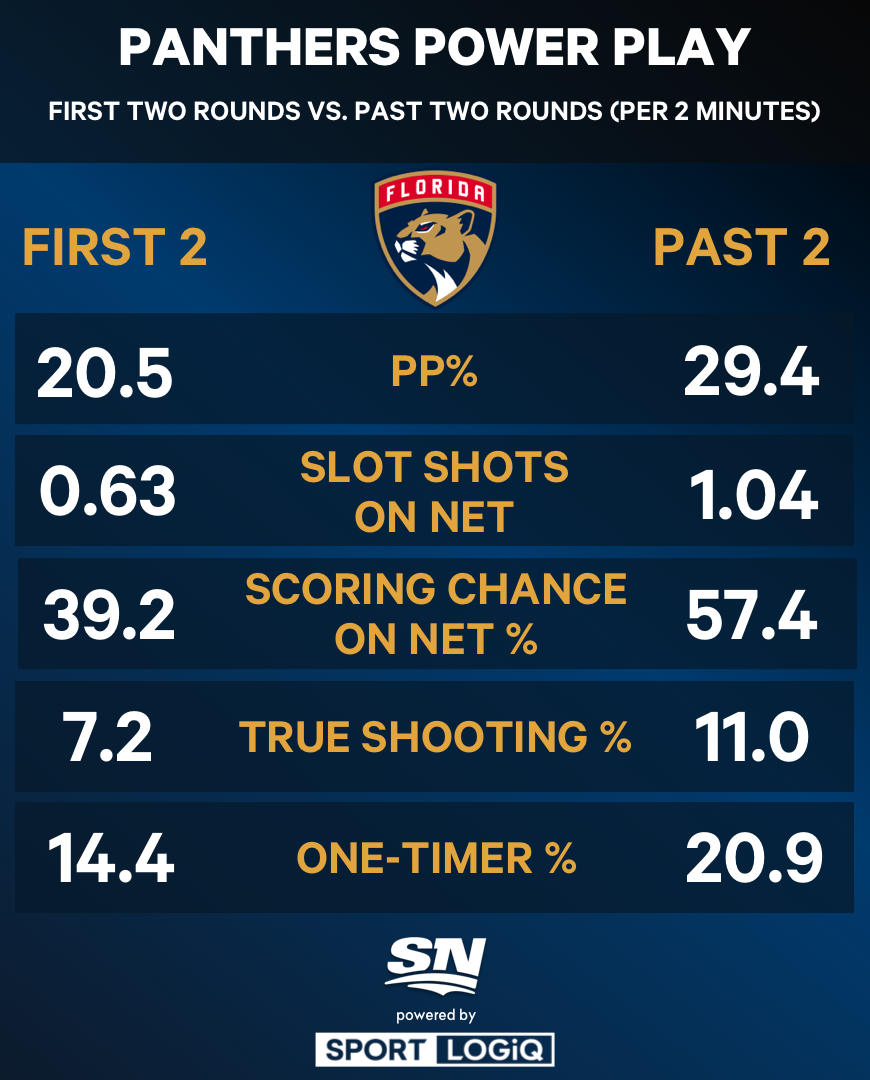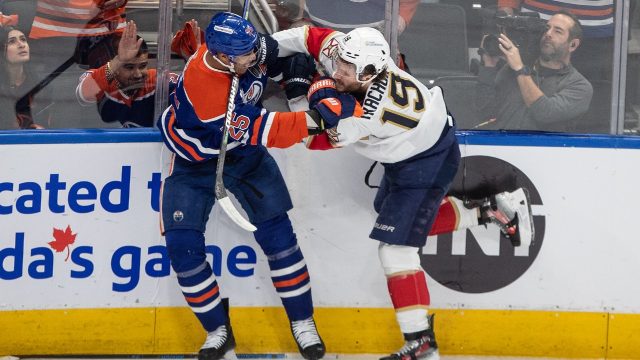
The Edmonton Oilers fell prey to the Florida Panthers’ antics Monday, racking up a ridiculous 85 penalty minutes in a 6-1 loss. Not since 1986, when the ending of Game 4 between the Montreal Canadiens (90 penalty minutes) and Calgary Flames (86 penalty minutes) devolved into chaos, had a team been so undisciplined in a Stanley Cup Final contest.
Edmonton handed Florida 11 power plays, including four in the first period as a result of three offensive-zone penalties and a too-many-men infraction. The Panthers scored on three of their opportunities and ran up the score with two power-play goals in the third period. They dissected the Oilers’ penalty kill with precision passing on defenceman Aaron Ekblad’s goal, which chased goaltender Stuart Skinner from the game.
Remarkably, the Panthers were 1-for-28 on the power play (3.6 per cent) at home this post-season before Monday. Their 41.2 per cent success rate on the road is the ninth-highest on record, out of 354 teams that have played at least five road games in a playoff year.
“I would suggest that we’re not either, and no team is,” Panthers coach Paul Maurice told reporters before Game 3. “We’ve never run a 40 per cent power play, home or road, and we don’t run a 4 per cent power play, home or road. I have absolutely no idea why those numbers are so skewed. We’ve talked about it, and then once we got to the point we couldn’t figure it out, we just left it alone.”
Nonetheless, the Oilers are playing a dangerous game with the Panthers, who have been gaining momentum on the man advantage in recent weeks. Since the start of the previous round, Florida has converted 10 of its 34 power-play opportunities (29.4 per cent) after going 8-for-39 (20.5 per cent) in Rounds 1 and 2.
The key to the Panthers’ improved execution on the power play has been a greater presence in the slot. After averaging 0.63 slot shots on net per two minutes against the Tampa Bay Lightning and Toronto Maple Leafs, the Panthers are up to 1.04 slot shots over the past eight games.
Through two rounds, the Panthers were the worst team in the playoff field at putting their scoring chances on net by a wide margin (39.2 per cent), missing 12 of their 51 attempts and having 19 others blocked. That rate has increased to 57.4 per cent since the Eastern Conference Final, leading to eight power-play goals from the slot.
Unlike last year, when the Oilers’ penalty kill functioned at historic levels during the playoffs (66-for-70), that unit has been far from a strength, plummeting 27.1 percentage points to 67.2 per cent (43-for-64). Edmonton’s opponents are having a much easier time getting the puck to the slot, completing 67.1 per cent of their passes to that area of the ice — up from 56 per cent last post-season.
Florida has completed 63.6 per cent of its power-play slot passes and generated 2.04 scoring chances per two minutes in the Stanley Cup Final. The latter figure is the Panthers’ highest of the four series they have played this spring.
Oilers players have insisted over the past couple of days that they will do a better job of turning the other cheek in Game 4 on Thursday, but that is easier said than done against the Panthers’ army of irritants. The Oilers skater most prone to being goaded into penalties is Evander Kane, who has taken five and drawn zero in the Stanley Cup Final. Kane went to the penalty box twice within the eight minutes of Game 3 and has the worst penalty differential in the playoffs at minus-9.
“Florida does a really good job of that,” Oilers coach Kris Knoblauch told reporters Tuesday. “That’s their game. They like that. … Some guys thrive on those extracurricular activities, things that happen after the whistle. But I think some of our guys got a little distracted with that. I think it’s most important for us to play in between the whistles.”
The special-teams advantage has been lopsided in the Panthers’ favour; Florida has outscored Edmonton 6-3, including forward Brad Marchand’s short-handed goal in Game 2. Over 10 Stanley Cup Final games against the Panthers in the past two years, the Oilers have been shorthanded an average of three times per game in four wins and 4.33 times per game in six losses.
“That’s their brand,” Oilers defenceman Mattias Ekholm told reporters Tuesday. “That’s what they do really well. But at the same time, we’ve won four games against them in (the Stanley Cup Final) in the last two years. I think (if) you look at those games, we are a very focused group. We play our game. We don’t let that even creep in a little bit. Maybe we lost that a little bit (Monday), but we know what to do.”







